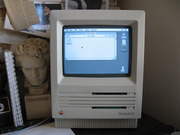
I've long been fascinated by the 68K Macs of the mid-80s. My mother used to tell stories of using one at work (where her coworkers would dismiss its WYSIWYG capabilities with a derisive "It lies!"). When I realized how close Commodore GEOS is to the Mac's user interface, I just had to have one.
In the summer of 2010, I acquired a Macintosh SE; the original owner had stuffed two floppy drives and a hard drive into it. One of the floppy drives seemed to have the dreaded "stiction", but when I got a Torx T15 with a long enough shaft, opened the case, and took it apart (no small feat with that much hardware inside), I found that the drives were just slightly misaligned in relation to the floppy slots on the front of the case. A bit of push 'n' pull while retightening some screws fixed that right up, and after getting to know the machine, I did a fresh install of System 7.1. Later, I acquired an SE/30 as well, which is what I've mostly been using. Its hard drive failed not too long after I got it, so replaced it with a SCSI2SD (holding it in place in the drive cage with a cat's-cradle made from string) and was able to install System 7.1 onto it as well.
Both SEs have Asanté network cards, so naturally I wanted to set up
a Linux box as a file server using netatalk (AppleTalk over
TCP/IP). These are the steps I followed after I got my hands on a CD
image containing a whole lot of classic Mac software:
hfsutils on the Linux boxhmount /mnt/common/download/macintosh/Apple_Legacy_CD.isohcopy -b MacTCP.img /mnt/common/MacShare/netatalk utility:unhex MacTCP.img.hqx-t hfs and serve the mounted directory via
netatalk.
After a few false starts, I fired up a copy of ircle and connected to Freenode just to see what would happen... and lo and behold! I was on the 'net! Now anything is possible...
Once the Mac was running TCP/IP, I learned to set
up netatalk, and now the Linux share appears as an icon on
the SE's desktop. This means that I can download software from the
internet to the Linux box and copy it from there to the SE. The first
problem is how to get the files into the proper Macintosh data
fork/resource fork file format. For now, I've been using the tools
like unhex and unbin that come
with netatalk, but I'm having only about a 50% success
rate. One of the most frustrating problems I've had so far is when I
get a successful conversion and end up with a file in StuffIt
format... that needs a newer version of StuffIt than I have on the SE.